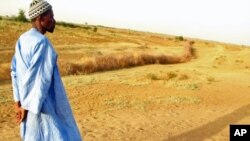As experts gather in The Hague this week for a Global Conference on Agriculture, Food Security and Climate Change, a major issue concerning Africa is the importance of the continent's soil.
Experts differ on the best ways to turn often parched and depleted land into fertile ground. But there is general agreement that it is an issue that needs to be addressed.
The director of the Tropical Agriculture and Rural Environment program at Columbia University, Pedro Sanchez,
says, it seems obvious now, but, until recently, soil was not considered a priority.
"In Africa, really, nobody was paying attention about this 10 years ago. Everybody thought that other problems were more overwhelming, problems of corruption, governance, land tenure and then technically, agronomically, the need for improved [plant] varieties," he said.
Sanchez sees the use of fertilizers as essential to replenishing soils. "The best way to do that is to start applying nitrogen fertilizers and phosphorous fertilizers in the places that are deficient in this element, and out of that, then, you begin to triple yields of crops, such as maize, or sorghum or cassava," he said.
Shannon Horst is a co-founder of the U.S-based Savory Institute, a non-governmental organization that works to restore grasslands and biodiversity around the world. She believes still too much emphasis is being placed on short term production goals and technological solutions.
"We need to be focusing on the soil and the health of the soil and so many of the current things [issues] that are being pushed focus on high-tech solutions where you manipulate seeds, where you manipulate fertilizer or you create monocultures. And, most of those practices do not result in producing healthy soil. And, so, many of the challenges that Africa is facing are related to the fact that its soils are collapsing," she said.
She says with programs focused on short term yields, soil will continue to be less able to hold water, leading to more and more droughts, while also increasing the chances of flooding when rain does come.
Horst says she believes traditional pastoral practices, with vast herds of grazing animals leaving behind manure, create healthier land and should be kept up.
But Sanchez points to Malawi as a test case, which he says aggressively promoted the use of fertilizers to evolve from a country dependent on food aid to a food exporter. He says what happens with this approach is that roots and residue of crops decompose and naturally replenish soil.
Sanchez would like to see Malawi's model duplicated elsewhere. "This has to be scaled up now to all sorts of places by governments, by farmers themselves, by the aid agencies," she said.
To help in this debate, the African Soils Information Service, funded by the Bill and Melinda Gates Foundation, is now working on making its interactive digital soil map of the continent available to farmers through their mobile phones, so they can make decisions based on data and comparisons.
Experts agree the growing trend of vast amounts of African land being loaned out to outside governments and companies to develop agricultural goods and minerals will also affect the debate on how best to replenish Africa's soil.
Experts, Activists Debate How to Improve Africa's Soil




